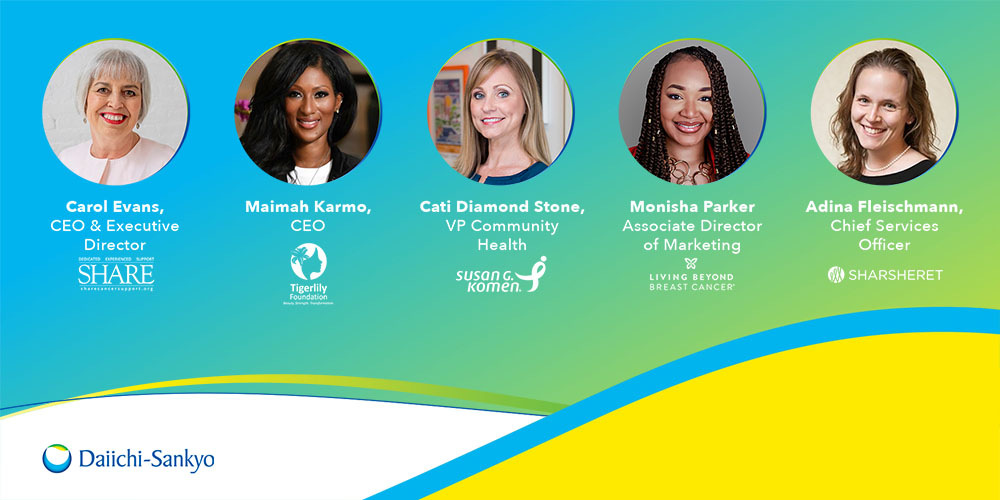
Meeting the Needs of a Diverse Community
I’ve spent the last 15 years advocating for people who are living with cancer – including the approximately 4 million Americans with breast cancer1. It’s incredibly moving and important work to amplify their voices and ensure they are being heard as I strive, in partnership with my colleagues, collaborators and patient advocacy groups around the globe, to make a meaningful difference in their day-to-day lives.
I learned very quickly that while people with breast cancer ‘share’ a diagnosis, in reality, they are a diverse group comprised of various ethnicities, ages and genders. As each of these individuals takes on the disease, they, and their caregivers, will have unique needs shaped by who they are, where they come from, what subtype of breast cancer they have, how advanced and aggressive their cancer is and what drives their tumors to grow.
By viewing and engaging with the breast cancer landscape as a cluster of communities with some commonalities yet often very different needs, we can better support patients, particularly those who are underserved.
Our dedicated advocacy partners are hard at work developing solutions and providing resources to help these patients, and at Daiichi Sankyo, we share their commitment. My team works directly with dozens of organizations across the spectrum that are devoted to advocating for the breast cancer community, and we talk to hundreds more about how we can support and amplify their work. I recently spoke with a few of our partners about some of the challenges that people living with breast cancer face, and how they are helping to ensure everyone living with the disease feels seen and heard. Here are highlights of what they shared:
Fostering a better understanding of unique experiences across a range of ages
“There can sometimes be a misperception that breast cancer is a disease of middle age, but the reality is nearly half of the overall breast cancer population falls outside that age range2, 3,” said Carol Evans, CEO and Executive Director, SHARE Cancer Support. “Approximately one third of women with breast cancer are over the age of 70, but this age group is typically not included in cancer clinical trials3, so their disease is managed based on data from younger women. We’re working to ensure that older women with breast cancer are better represented in research, and that their voices are heard.”
Shining a light on breast cancer in women of color
“Black women in the U.S. are diagnosed at younger ages and with more aggressive types of breast cancer than any other group4,” said Maimah Karmo, CEO, Tigerlily Foundation. “We initiated the ANGEL Advocacy program to help Black women share their stories and advocate on behalf of themselves and their community to make system-wide impacts and improve health outcomes.”
Acknowledging and addressing the unique set of challenges that accompany metastatic disease
“A diagnosis of metastatic breast cancer (MBC) is devastating, resulting in a unique set of challenges,” said Cati Diamond Stone, VP, Community Health, Susan G. Komen. “Komen is working to address these challenges through investments in research, public policy and direct patient support programs specifically designed to address the needs of the MBC community. One example is our Patient Care Center, which provides people living with MBC with personalized care designed to meet their unique needs with support from oncology social workers, patient navigators and trained specialists who provide emotional support and help remove barriers to high-quality care.”
Giving voice to demographic differences when it comes to geography, gender and sexual orientation
“Every person with breast cancer has a unique experience,” said Monisha Parker, Associate Director of Marketing, Living Beyond Breast Cancer. “We’re giving voice to these stories through ‘Together we C.A.N.,’ an initiative to Change the conversation by ensuring all voices are represented in the lived experience of breast cancer, Assist those impacted in getting the information they deserve and Nurture the building of communities of support for those who might not have a built-in network of patients like them.”
Supporting the caregivers
“Cancer doesn’t just affect the patient, it impacts those who care for them – healthcare providers and family caregivers,” said Adina Fleischmann, Chief Services Officer, Sharsheret. “We train healthcare providers and support caregivers, who are so critical in breast cancer, to empower them to better meet the needs of their patients and loved ones.”
These conversations were illuminating and enlightening, and underscore the importance of the work we’re doing together to ensure these patients are seen and heard. As we strive to develop novel treatments to improve patients’ outcomes, we’ll keep working to raise awareness of the many different faces of breast cancer to help ensure that every person impacted by this disease feels seen, heard and, most importantly, supported. I won’t stop until they do.
Learn more about other ways we’re sharing the unique stories of patients HERE.
1American Cancer Society. Cancer Treatment & Survivorship Facts & Figures 2022-2024. Accessed October 2022.
2Beth Israel Lahey Health. Breast Cancer Myths Debunked. Accessed October 2022.
3Elomrani F, et al. Breast Cancer (Dove Med Press). 2015; 7: 165–171.
4Stringer-Reasor, et al. ASCO Educational Book. 2021. E29-e46.
Suggestions
Daiichi Sankyo CARE Teams go above and beyond educating healthcare providers about our medicines and providing patient support. Discover how we CARE...
While our lungs support our very existence, we often don’t recognize that something isn’t quite right with our lung health. Get answers to questions about lung cancer and listen to empowered patients...
Growing up in a Spanish-speaking home, I was the family translator—a role that became particularly challenging when my mother was diagnosed with breast cancer. My family relied on me…